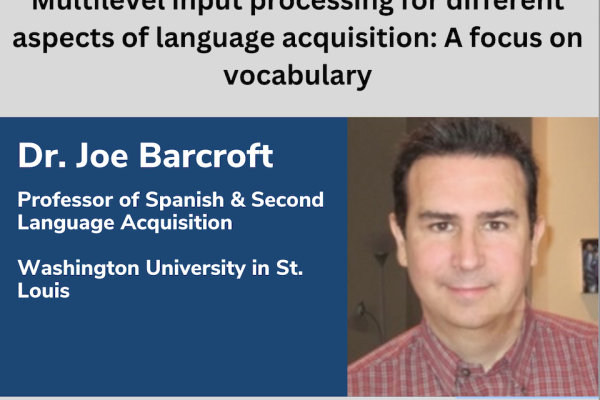
Dr. Joe Barcroft: Multilevel input processing for different aspects of language acquisition: The theoretical framework and a focus on vocabulary
Professor of Spanish & Second Language Acquisition
Washington University in St. Louis
MONDAY, MARCH 27, 4:15-5:15 PM
180 Hagerty Hall
Reception To Follow
This presentation begins by highlighting the importance of multilevel input processing, which refers to how language learners process input (samples of a target language to which they are exposed) at different levels of linguistic grain in order to acquire different aspects of language. The discussion includes, for example, how the notion of intake (the subset of input with data suitable for linguistic development) changes as we pivot our focus from one linguistic system to another, such as from phonology to lexis to syntax to pragmatics. The remainder of the presentation then focuses on vocabulary (lexis) in particular, demonstrating how research on lexical input processing over the past 25 years has advanced theory and practice related to vocabulary learning and instruction. The following issues, among others, are discussed: (a) why it is important to distinguish between word form, word meaning, and word mapping as dissociable components of vocabulary knowledge; (b) how opportunities to retrieve target words strengthens networks in memory and increases vocabulary learning; and (c) why word form variability in spoken-mode input (acoustic variability, such as when using multiple talkers, speaking styles, or speaking rates to present target words) improves word form learning whereas referent token variability, on the other hand, actually decreases it. We conclude by considering the advantages of a full-scale approach to vocabulary instruction that is input-based and incremental in nature.
Sponsors:
CLLC, BuckLER Center, Classics, DEALL, FRIT, GLL, Program in Modern Greek, SPPO, Linguistics, SEELC
Filed in:
- African American and African Studies - AAAS
- American Sign Language - ASL
- Center for Languages, Literatures and Cultures - CLLC
- Classics and Modern Greek
- Comparative Studies
- East Asian Languages and Literatures - DEALL
- French and Italian - FRIT
- Germanic Languages and Literatures
- Near Eastern and South Asian Languages and Cultures - NESA
- Slavic and East European Languages and Cultures
- Spanish and Portuguese - SPPO
